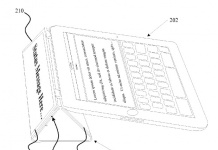 Imagine—under-$100 tablets for libraries. Suppose they can display public domain books and other free content and run library e-book apps from companies such as OverDrive. That day isn’t here yet. But it’s fast approaching. Who says iPads, Kindles, Nooks and Sony Readers will be the only games out there?
Imagine—under-$100 tablets for libraries. Suppose they can display public domain books and other free content and run library e-book apps from companies such as OverDrive. That day isn’t here yet. But it’s fast approaching. Who says iPads, Kindles, Nooks and Sony Readers will be the only games out there?
The eight-inch Android tablet shown to the left sells now for $143.10 at Amazon. $100 in a year or so? With better than the current 800-by-400 resolution? And more than one user review at Amazon, so a purchase is less of a gamble?
You can even plunk down $124 for a rather problematic seven-inch Android tablet passing itself off in a photo as an iPad clone (I wonder about the 720p in the display-related specs, if nothing else). What’s more, there’s also the seven-inch Pandigitial Novel, an Android-based color ebook reader on sale at some places for less than $150 with special offers included. Again, a flawed machine—but a hint of better things to come. Same for the $199 Cruz Reader.
 And now a question for library geeks out there: Are any of you experimenting with super-cheap Android machines, given their low costs and the forthcoming software from a major library vendor like OverDrive? Here’s a chance to stay ahead of your users. If I were a public librarian, I’d think about such angles as:
And now a question for library geeks out there: Are any of you experimenting with super-cheap Android machines, given their low costs and the forthcoming software from a major library vendor like OverDrive? Here’s a chance to stay ahead of your users. If I were a public librarian, I’d think about such angles as:
–The greater demand that the new tablets will create for e-books. Will library budgets be ready? Will people be able to borrow a wide variety of books in E, not just the genre novels and other typical e-book fare? And will your tech support be up to snuff.
–Possible retaliation from certain publishers, fearing that their business models are more threatened than ever. Will some just stop making their books available to libraries or insist on library-hostile terms, if e-books are finally easy to check out with OverDrive’s new software? Should librarians and vendors such as OverDrive try harder to pick up books from smaller, more flexible publishers?
–New business opportunities, at least in cases where the law allows and resources are available. Could certain libraries work directly with vendors and distributors or with retailers so that library visitors can easily buy Android machines on the spot. The libraries could turn at least small profits. When the price goes below $100, the hardware will be fodder for impulse purchases, at least in affluent areas.
I’m also curious what the extra-cheap tablets will mean for libraries’ relationships with school systems, if more students can download e-books and other content directly. If fewer students show up at the libraries, could this hurt the quality of their work—since professional research guidance will no longer be within a few feet of them? Could public librarians fill in the gaps remotely? Public librarians are not school librarian substitutes, and vice versa, but the firings of school librarians will not help matters.
 Reminder: I’ve focused on Android tablets, but Android phones are likewise worthy of attention.
Reminder: I’ve focused on Android tablets, but Android phones are likewise worthy of attention.
And finally: At least one well-known library blogger—Sarah (“Librarian in Black”) Houghton-Jan, the Digital Futures Manager for the San Jose Public Library—is already Android-hip. I’ll welcome Sarah’s thoughts on the above issues.
Update, 11:40 a.m.: A librarian friend of mine observes that users tend to prefer their own hardware, not the library-chosen variety. True! But as I myself see it, library-related options should be available in cases where there’s sufficient local interest. What’s more, Android tablets’ economies can boost e-book use no matter who owns or recommends the machines.


































It makes sense to me that if the town library system adopts Overdrive (are there any competitors? Is Overdrive pushing itself into a monopoly position there?), then the town school system would be smart in adopting a one-to-one solution that is supported by Overdrive software.
Is there any friction between Overdrive and publishers? Since Overdrive is subscription-based, it would seem to be merely a matter of how much of the pie publishers get to cut for themselves, to keep them happy. They would have virtually no costs other than accounting to keep track of it, and a guaranteed and perpetual source of revenue … sounds like a system the publishers would love.
Currently, publishers sell a copy or two to a library, and the publisher’s revenue ceases. Under any subscription system, the initial revenue of a digital copy would be a lot less than the hardback sales revenue, but then the money would continue to roll in, year after year, so long as the book remains popular enough to be ‘taken out’ by some library patron, somewhere within the vast, global Overdrive system.
— asotir
Thoughtful comments, Asotir. OCLC has sold off NetLibrary; and ideally the new owners, EBSCO, can reinvent it to provide more competition for OverDrive. There are other competitors, too, but OverDrive is in fact the largest provider of e-books for public libraries.
Friction? Look for some possibly ahead. Mike Shatzkin, a prominent consultant for the publishing industry, is wondering what will happen to public libraries and publishers as people discover they can borrow e-books without as much fuss as with the old-fashioned variety. As for library-related biz models, they’ll vary. Perhaps some public librarians can give us the very latest info, but as I understand it, libraries can buy e-books under varying conditions–for example, allowances for a certain number of uses.
Let’s hope that all can work out a nice solution. Handled well, e-books could a major positive for publishers and libraries alike.
Thanks,
David
Currently, Macmillan and Simon & Schuster titles are not available through OverDrive’s library lending system.
I am currently constructing a near zero cost, one to two gb e-library for my school. The future is definitely promising as production efficiencies and market saturation drive down e-reader/tablet prices. As far as publishing houses go I am avoiding having to interact with them at all by focusing on creative commons and public domain titles. It is a shame but some of our schools will and towns may have a hard time finding funds for offering electronic titles. The old gatekeepers’ influence may be waning but delivery costs for newer content is going to be high at least into the foreseeable future.
Doug, that’s what I vaguely recall—thanks for pinning it down. So Mike’s concerns are more than theoretical. The big question is whether this will spread to many other major publishers if e-books become “too” popular, due partly to the drop in hardware prices.
David
Alex, the very best of luck with your project! Keep us posted! I’d like to see others think about do-it-yourself libraries for their schools. Can you tell us more? Any URLs?
That said, you might try the smaller publishers and also ask OverDrive about doing the same. If OverDrive won’t adjust, then maybe libraries need to form a consortium focused on good, low-cast books from more flexible publishers.
Let me also say I think students’ reading needs should come ahead of everything, within reason; and I wonder what they’ll lose out on if you don’t go beyond pub domain and cc. Something to think about it least. At a macro level, see my writings on an iPad-related stimulus plan, which includes a library component. Please understand that I want an open approach and lots of lots of competition—the use of the I name is just a hook to get people interested. URL is below.
Thanks,
David
http://www.theatlantic.com/science/archive/2010/06/guest-post-david-rothman-on-the-ipad-stimulus-plan/58539/
Alex: be very careful with Creative Commons. A CC license (version 2 or later) does not, by itself, give the user of the work any rights. It only relinquishes certain of the licensor’s rights—rights may not even have existed. Since version 2, the CC licenses explicitly say that the licensor does not represent that s/he has any rights to the work, much less all rights to the work.
In the meantime, would you like to buy the Brooklyn Bridge? I’d be glad to sell you a quit-claim deed on it.
Doug, thanks for the heads up. It is a process that is wrought with an immense amount of complexity. I avoided almost all contemporary works as well as anything that didn’t vibe with a useful Stanford University guide to modern copyright laws. I am leaning overwhelmingly towards titles which are clearly under “public domain” -Jane Eyre books for example- status as opposed to creative commons for the very reason you have wisely outlined. David, I am going to take a look at the Atlantic piece you have linked and share my thoughts soon.
David:
I would like to start by relaying my best wishes to you. It seems that you have singlehandedly championed pragmatic and reasonable solutions to problems which I feel passionate about. Our country faces incredibly difficult challenges in the coming years, but few are as intellectually damning as the curtailing of local services and/or the closing of public libraries. In New Jersey we are coming to terms with a massive reduction in funding that libraries receive from the state government. If the situation is bleak in New Jersey I cannot fathom how bleak it may be in more cash strapped states which lack the multifaceted economy my state is blessed with.
A National Digital Library is a goal which we are both in agreement on, but where we depart is in how to get there. I was impressed by your drawing such a powerful parallel with our country’s healthcare system and the challenges faced in implementing a National Digital Library. These challenges –strong corporate interests coupled with political apathy- make top-down change a difficult proposition. In the end, I feel that the most effective way to get to a national system will be through creating robust local systems, then linking these systems together at the county/state level, and eventually creating a serviceable model from these disjointed networks.
There are many challenges in implementing reforms or introducing technology in education. I have had the pleasure of working with an amazing group of educational professionals but have also witnessed the most appalling reactions to technology initiatives by people within this field. Everything from using smartboards as coat racks, using them to show overhead transparencies, as well as frequent complaint sessions regarding having to post lesson plans online: the latter being never satiated regardless of the oversight benefit that such an action would bring to both educators and parents. This is before we even delve into the pervasive tendency that some educators have regardless of age, specializations and/or locations towards common schooling: which is defined by an obsolete focus on memorization instead of pushing the more technologically beneficial concepts of synthesis and creation. The new Common Core Standards may help or hinder any progress currently being made in regards to this problem. Either way, simply giving educators technology may not make them anymore likely to either accept it or even use it.
Something of note is also the distinct possibility, that the scoring gaps in reading and math, between the disadvantaged and those who are more fortunate, may actually be widened by immediately introducing technology, without first preparing the former group to accept technology in a constructive way. This is not to knock the idea of introducing technology or even the premise of tying it to a National Library, but to rather to ensure that it is done in a way which guarantees results. Implementing subsidies without vetting these types of concerns could needlessly sully a worthwhile endeavor. This would only further aide folks who are on the opposite end of our political spectrum concerning the expanding role of government.
I must admit that your take on revamping our country’s copyright laws is spot on. Those unfamiliar with the way Americans are being shortchanged should look into the two following pieces of legislation:
Copyright Term Extension Act of 1998
This act extended copyright privileges for intellectual property rights by as much as 70 years.
Digital Millennium Copyright Act of 1998
This criminalizes production and dissemination of technology, devices, or services intended to circumvent measures (commonly known as digital rights management or DRM) that control access to copyrighted works. It also criminalizes the act of circumventing an access control, whether or not there is actual infringement of copyright itself.
As well as your own seminal work:
Copyright and K-12:
Who Pays in the Network Era? (1992) pivotal resource concerning the nexus between copyright and education.
I’ll make sure to keep Teleread readers informed as to the arduous and rewarding progress of creating a Digital Library at my respective school.
Thanks for such a heartfelt and well-crafted note, Alex, and I’ll look forward to further news of your work. Perhaps Paul Biba, TeleRead’s editor, can publish your thoughts in the main part of the blog.
I couldn’t agree with you more about the need to prepare people to use the technology, especially those outside the elite. This is one reason why I want training for teachers and librarians, so they can address these issues. As it is, students in some low-income households are at a considerable disadvantage in not having a computer at home. My information stimulus plan, including the TeleRead component, could help address these matters. I’m all in favor of actions like yours in the local level; but we can at least try to educate top policymakers and work for a TeleRead-style approach. Meanwhile keep in mind my interest in seeing local libraries influence book selection for their patrons, so D.C. doesn’t dictate collection development in rural Mississippi. None other than William F. Buckley, Jr., was a booster of the basic TeleRead concept because of my interest in local options.
Meanwhile I’m curious if you live in the Montclair area or another suburb where Baristanet.com operates. I was just in touch with a co-owner of Baristanet on another matter, and, if it’ll help, I suspect she would be pleased to give your project publicity to help attract volunteers.
Stay in touch.
David / davidrothman@pobox.com / 703-370-6540